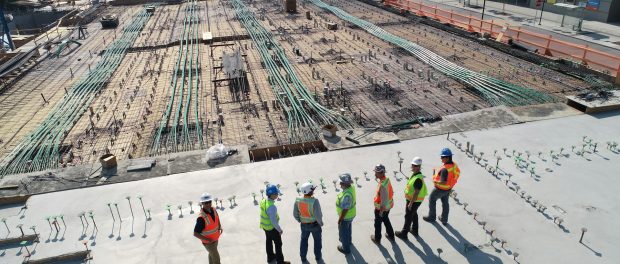The Essential Guide to Project Management Solutions for Large-Scale Construction Projects

When you build a hospital wing, data center or transit line, the real challenge is aligning thousands of moving pieces. For work at this scale, you seldom need more software — you need partners who can track the details, warn you early and keep the job moving toward handover.
What Is Construction Project Management?
Construction project management is the disciplined practice of planning, coordinating, and overseeing every phase of a build so that scope, time, cost, quality and safety all land where you promised. That means setting the baseline schedule, running progress meetings, adjusting resources and resolving snags before they stall the site.
Top Project Management Solutions for Large-Scale Construction
The team looked at third-party data and conducted research to come up with the best three. Four plain-language checks occurred in the selection process:
● Reach: Does the firm work on jobs worldwide, particularly in the U.S. and U.K.?
● Hands-on help: Does the company supply planners, schedulers and risk advisers on site rather than just sell software?
● Big-job proof: Has the business already steered at least one project worth a billion dollars or more?
● Results: Do owners publicly share positive stories about schedule, budget and risk control?
1. Spire Consulting Group
Spire Consulting Group grew out of forensic claims work, so its project managers start by asking, “Where does this job usually go wrong?” That mindset shapes its proactive forensic model, which pairs critical path method (CPM) schedulers with cost analysts to spot slippage while it can still be fixed. From day one, Spire builds a baseline schedule, ties every work package to resources and then tracks earned value weekly.
Clients ranging from federal agencies to private developers use Spire to manage courthouse renovations, high-rise towers and rail extensions — the same team that prevents claims can defend the record if one appears. You also gain access to a full project-control bench — delay analysts, expert witnesses and change-order specialists. The data are already organized for mediation or testimony if a dispute surfaces.
2. EY
EY places financial discipline at the core of its construction advisory work. Dedicated capital projects consulting teams embed a governance framework that links budget authorization, field progress and procurement milestones to one real-time dashboard — no surprises at board meetings. On multi-site programs, EY sets up a program-management office that standardizes contract language, risk scoring and payment review across every region.
Because EY is also a global audit and tax firm, you can tap specialists in supply-chain analysis, environmental, social, and governance (ESG) reporting or automated invoice workflows, cutting payment cycles and strengthening cash forecasting. The result is tighter cost control without burying superintendents in spreadsheet work.
3. Exponent
If your schedule depends on sensitive geotechnical work or unfamiliar materials, Exponent supplies the cross-disciplinary firepower to keep construction moving. Its engineers and project managers build and audit CPM schedules line by line, confirming that logic ties and float match contract requirements before the first pour. During  execution, its advisory group runs targeted risk workshops and issues priority actions that close the gap between plan and reality.
execution, its advisory group runs targeted risk workshops and issues priority actions that close the gap between plan and reality.
What makes Exponent different is its depth in forensic engineering. Should a hidden cavity, weld failure or vibration issue threaten the timeline, in-house experts can model the problem, suggest a remedy and document the outcomes for any subsequent claim.
Key Features Compared
| Firm | Primary Focus | Signature Service | Extra Edge |
| Spire | Early risk detection through schedule and cost control | Real-time CPM scheduling paired with earned value tracking | Claims experts are already on the team, ready if disputes arise |
| EY | Governance and financial transparency | Program management office with integrated cost, procurement and risk dashboards | Access to global audit, tax, ESG specialists, plus automated payment tools |
| Exponent | Technical risk and forensic clarity | Contract-compliant schedule audits followed by life cycle advisory | On-staff engineers who can diagnose and solve structural or materials issues |
Finding the Best Project Management Solutions for You
You run the job — these project management solutions for construction supply the outside eyes that keep it predictable. Spire excels when you want risk signals as early as possible, EY when you need portfolio-wide financial clarity and Exponent when technical uncertainty could upend progress. Match their strengths to your project’s biggest pain points, and you will give your next large-scale build a smoother path to ribbon cutting.
biggest pain points, and you will give your next large-scale build a smoother path to ribbon cutting.
FAQs
When should you bring in a project management consultant?
Engage a consultant when you have a rough scope and preliminary budget — ideally during concept design. Early involvement lets them build the baseline, flag unrealistic milestones and shape contract terms that prevent costly changes later.
What are the must-track metrics on a large-scale build?
Focus on four indicators you can review weekly:
1. Planned vs. actual schedule percent complete
2. Earned value cost variance, or how much you spent versus what you should have spent for the work finished
3. Critical-path float — to see if delays are eating up your buffer
4. Open risk log items ranked by dollar and schedule impact
How do outside project management solutions providers lower cost overruns?
They install proven controls — clear work-package budgets, project dashboards and contract-linked schedules — so deviations show up early. Because they sit outside the day-to-day politics, they can escalate issues and negotiate fixes before small slips snowball into multimillion-dollar overruns.

